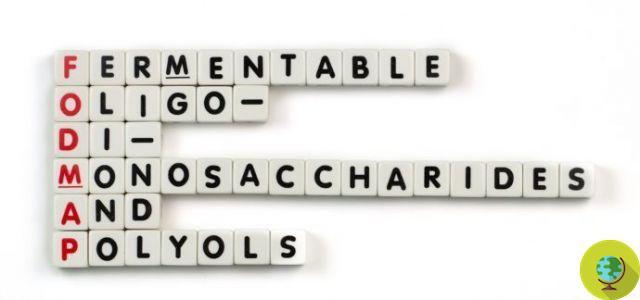The low-Fodmap diet has been found to be very effective in managing swollen stomach and irritable bowel syndrome
The low Fodmap diet has been found to be very effective in managing swollen stomach and irritable bowel syndrome. But what are FODMAPs?
Some foods rich in certain sugars can cause abdominal bloating, flatulence and diarrhea in susceptible individuals. These are the so-called FODMAPs, let's see which ones and what they are and the foods that contain more of them and that could cause swollen belly
We assume that fruits and vegetables are very good, and woe to eliminate them from the diet! Having said this, however, it sometimes happens, in predisposed subjects, that some vegetables (and not only) cause annoying and painful abdominal swelling, or symptoms such as flatulence, cramps, diarrhea.
Index
What are FODMAPs?
At the root of the problem there are often some sugars, such as lactose and fructose, called precisely FODMAP, an acronym that in English means "fermentable oligosaccharides, disaccharides and monosaccharides, and polyols". In fact, FODMAP stands for:
- F ermentable
- O ligosaccharides,
- D isaccharides
- M onosaccharides
- A ND
- P olyols

These sugars arrive in the final phase of digestion in the intestine where they are fermented by the bacterial flora, and if the latter is not exactly in balance, gases are generated, causing the aforementioned symptoms.
Broccoli, artichokes, chicory are the most indicted foods, but even what may seem a harmless fruit salad or a colorful refreshing juice or a poor fresh cheese, perhaps "light", actually hides pitfalls.
In fact, the researchers found that the small intestine does not absorb FODMAPs very well, which by increasing the amount of fluid in the intestine, also creates more gas. The increase in fluids and gases in the intestines leads to bloating and changes in the rate at which food is digested. This results in gas, pain and diarrhea. Eating less of these types of carbohydrates should reduce bloated tummy and these ailments.
So far, studies have shown that a low-FODMAP diet improves IBS symptoms and that 76% of IBS patients have benefited.
Here are some examples of foods more or less rich in fodmaps.
Foods high in FODMAPs:
|
FRUCTOSE |
LACTOSE |
OLIGOSACCHARIDES |
POLYOLS |
|
Fruits: apples, pears, watermelon, peaches, mangoes Honey Sweeteners: fructose, corn syrup High doses of fructose: fruit concentrates, fruit preserves, fruit juices, dried fruit. |
Milk: cow, sheep, goat, ice cream Cheeses: soft and fresh (ex: ricotta) |
Fruits: watermelon, persimmons, white peaches Vegetables: artichokes, asparagus, beets, cabbage, broccoli, Brussels sprouts, fennel, garlic, onion, shallot Cereals: wheat and rye when consumed in large quantities (bread, pasta, couscous, crackers, etc.) Legumes: chickpeas, lentils, peas, broad beans, beans |
Fruits: apples, apricots, cherries, pears, peaches, plums, watermelons, plums Vegetables: avocado, cauliflower, mushrooms Sweeteners: sorbitol, mannitol, xylitol and others ending in -ol
|
Foods low in FODMAPs:
|
FRUCTOSE |
LACTOSE |
OLIGOSACCHARIDES |
POLYOLS |
|---|---|---|---|
|
Fruits: banana, blueberry, grapefruit, grape, melon, kiwi, lemon, mandarin, orange, raspberry, strawberry. Honey substitutes: maple syrup Sweeteners: all except polyols |
Milk: delactosed, soy, rice Cheeses: hard and seasoned Ice cream substitutes: sorbets Butter |
Vegetables: bamboo shoots, celery, eggplant, green beans, peppers, lettuce, chives, pumpkin, tomato Cereals: rice, spelled, barley, cereals with corn flour |
Fruits: banana, blueberry, grapefruit, kiwi, mandarin, lemon, orange, grape, raspberry, strawberry Sweeteners: sugar (sucrose), glucose, sweeteners that do NOT end in - only unless taken in LARGE QUANTITIES |
Table taken from: Standard Of Practice, Department of Internal Medicine and Medical Specialties, Policlinico Umberto I in Rome
What can we do then? A poor fodmaps diet helps to counteract intestinal symptoms and improve overall well-being.
However, vegetables and dairy products that contain rapidly fermentable sugars do not necessarily have to be banned from the menu, rather we learn to control them in quantity and frequency within meals by relying on the help of a specialist.
And above all, remember that a swollen or sore belly is a signal of discomfort that the body sends us, so it is not enough to eliminate this or that food, we rather learn to listen to ourselves more!
Dr. Carla Graziosi
Dietitian
You might also like:
- How to fight a swollen belly: the foods to choose and those to avoid
- Why do you have to run to the bathroom right after eating? It's the fault of the gastro-colic reflex!
- 10 foods that can cause bloating
- 10 moves to deflate the belly and have a flat abdomen
- Here's how to fight a bloated belly
- Swollen belly: natural remedies for abdominal bloating


























